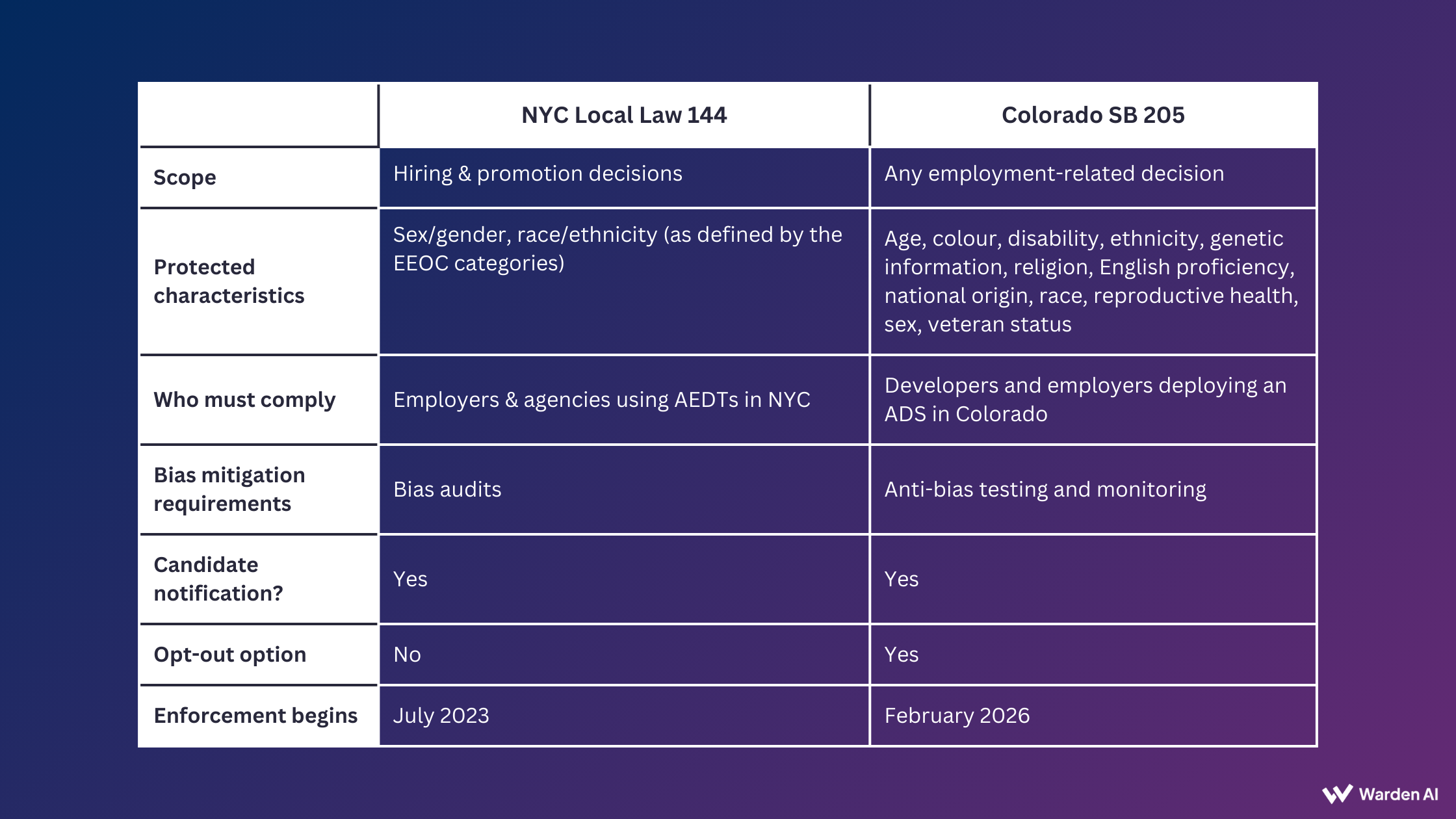It’s no surprise that AI has become increasingly embedded in hiring processes in recent years. In fact, in 2024, approximately 62.5% of companies are utilising AI for recruitment. Consequently, regulations are also evolving to accommodate the changing landscape to ensure fairness, transparency, and accountability in HR space. Two of the most notable HR tech regulations in the United States are Colorado SB 205 and New York City’s Local Law 144. While both laws aim to mitigate bias in hiring algorithms and promote ethical AI use, they differ in scope, requirements, and enforcement. Let’s break down the key similarities and differences to help HR professionals and AI vendors stay compliant.
Overview of Colorado SB 205
Colorado Senate Bill 205, effective in 2024, focuses on transparency and candidate rights when automated decision systems (ADS) are used in employment decisions. The law mandates that developers of AI systems:
- Provide documentation to deployers – Developers must supply clear documentation on their AI tool’s purpose, intended use, training data, anti-bias testing, and risk mitigation strategies.
- Monitor for bias across 12 protected characteristics – Developers must conduct ongoing testing for algorithmic discrimination related to age, colour, disability, ethnicity, genetic information, religion, English proficiency, national origin, race, reproductive health, sex, and veteran status. Any incidents of discrimination—whether detected in real-world use or testing—must be reported to deployers.
- Publish transparency information – Developers must disclose on their website the types of high-risk AI systems they have built and their approach to managing algorithmic discrimination.
Failure to comply can lead to penalties and reputational risks for businesses operating in Colorado.
Overview of NYC Local Law 144
New York City’s Local Law 144, which went into effect in July 2023, takes a more prescriptive approach. The law requires:
- Annual bias audits of automated employment decision tools (AEDTs).
- Public disclosure of audit results and the AEDT’s impact on demographic groups.
- Notification to candidates about the use of AEDTs.
- Employers to engage independent auditors to ensure objectivity.
Non-compliance can result in significant fines, with penalties up to $1,500 per violation.
Key Similarities
Despite their differences, both laws reflect a broader effort to regulate AI in hiring and employment decisions. Transparency is a core requirement under both laws—employers must notify job applicants and employees when AI-driven tools are being used to evaluate them. Additionally, both regulations emphasize the importance of fairness, aiming to reduce the risk of discrimination against legally protected groups, such as those defined by race, gender, or age.
While NYC requires an independent audit to measure potential bias, Colorado’s law mandates that deployers and employers take proactive steps to prevent discriminatory outcomes. Another key similarity is the requirement for human oversight. Both laws acknowledge that AI should not be making hiring decisions in isolation, ensuring that candidates have access to explanations and, in some cases, human intervention when AI-driven decisions significantly impact their employment prospects.
Key Differences

1. Scope and Applicability
- Colorado SB 205 applies to any developer and employer using ADS in hiring within the state.
- NYC Local Law 144 is limited to employers in New York City using AEDTs for employment decisions.
2. Audit Disclosure Transparency Requirements
- Colorado SB 205 does not specify public disclosure of audit results but mandates that employers document their bias mitigation measures.
- NYC Local Law 144 requires employers to publicly disclose bias audit results, making key findings accessible to the public.
3. Candidate Rights
- NYC Local Law 144 focuses on transparency by requiring employers to inform candidates about data collection and how automated decisions impact them. However, it does not provide an explicit opt-out option.
- Colorado SB 205, while also requiring notification, goes a step further by allowing candidates to request an alternative selection process if they do not want to be assessed by AI.
4. Enforcement
- Colorado SB 205 outlines penalties for noncompliance but does not specify exact fines.
- NYC Local Law 144 imposes clear financial penalties, creating stronger deterrents.
What these laws mean for HR tech companies
For HR tech companies, if you have customers who operate in New York City or Colorado, compliance isn’t optional. Even if you’re based elsewhere, these laws set a precedent that could spread nationwide. Here are some actionable steps:
- Invest in independent auditors: Even if Colorado doesn’t require audits, proactive bias testing can prevent legal and reputational risks.
- Enhance candidate communications: Develop clear, user-friendly notifications about ADS use and data processing. Make sure candidates know when AI is used and how it impacts decisions.
- Document processes: Don’t rely solely on AI; have review mechanisms in place. Maintain detailed records of audit results, data practices, and compliance measures.
Looking ahead
Both NYC Local Law 144 and Colorado SB 205 signal a growing push for fairness in AI-driven hiring. NYC focuses on bias audits and public transparency, while Colorado emphasises proactive discrimination mitigation and responsible AI documentation. Therefore, companies must stay agile, adopting proactive measures to meet varying legal standards. At Warden AI, we help organisations navigate these complexities by providing tools for comprehensive bias audits, anti-bias testing, and ongoing compliance monitoring—ensuring AI-driven hiring remains fair and legally compliant across jurisdictions.
Contact us to learn how our AI assurance platform can simplify compliance with Colorado SB 205, NYC Local Law 144, and beyond.





